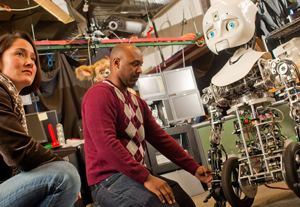Media Lab maverick
Joi Ito takes his Silicon Valley venture-capital savvy to MIT’s Media Lab.
By Andrew Clark
Photography by Sam Ogden

MIT’s Media Lab combines university research with Silicon Valley–style risk taking
While his peers were learning algebra, Joichi “Joi” Ito was the kid in junior high school already working on his career. “By the time I was 13, I was learning how to operate BBS and X.25 networks,” says Ito, X’90, who was born in Japan and grew up in the Detroit suburbs before moving back to Tokyo during his middle-school years. Fast-forward 30 years to Cambridge, Massachusetts, where in April Ito was named the new director of the Massachusetts Institute of Technology’s Media Lab.
It’s a job well suited to Ito, even if he’s an unusual hire for MIT. Enrolling first at Tufts (computer science) and then spending a year as a physics major at Chicago, he left college before completing his degree. "I once asked a professor to explain the solution to a problem so I could understand it more intuitively," Ito later wrote. "He said, ‘You can’t understand it intuitively. Just learn the formula so you’ll get the right answer.’ That was it for me.”
He taught himself computer science when it “wasn’t formalized in education,” says Ito. “I immersed myself in different projects where I had to learn the technology. Basically it was like learning the stuff off the street.”
It may have been nontraditional, but Ito’s self-education worked. He has become a pop star in the world of digital technology, earning a nod as one of the 25 Most Influential People on the Web by Business Week in 2008.
A strong believer in the "open" web, that the Internet should be a place where users share content, Ito was an early blogger, publishing on joi.ito.com/weblog since 1993. He also has been an adviser at Twitter, an early-stage investor in Flickr, and cofounder of Digital Garage. “His CV reads like a history of the web,” writes Dave Lee in a July 2010 BBC story.
Until this past March, Ito was CEO of Creative Commons, a company that provides copyright licenses and tools to promote sharing in the digital community. “I came on with the company early on, with the goal of helping their academic idea become more global,” says Ito, who joined Creative Commons as a board member in 2003, becoming its CEO in 2008. He now chairs the company, which provides “a ‘some rights reserved’ approach to copyright,” as its website explains. Ito promoted and expanded Creative Commons across the globe during his time as CEO. Now Al Jazeera, the White House, Wikipedia, and Google all release material under the company’s licenses. This year’s Creative Commons Global Summit will be held in Warsaw, Poland, in September.
Also in September, Ito will become the MIT Media Lab’s fourth director. The lab—which is host to scientists, engineers, and designers working on some 350 different projects—is "incredibly interdisciplinary,” he says. “There’s a great impact on the world with the work that’s being done there. We come up with solutions to a lot of problems.”
Ito is excited about the potential for combining university research “with the agility and risk-taking approach of Silicon Valley start-ups," he told the New York Times in April. The Media Lab’s mission is to apply “unorthodox” research methods to imagine how technology might affect everyday life. One group, for example, is developing an interface that lets children write and choreograph stories acted out by robots. Many of the lab’s projects have seen large-scale success; the lab produced the technology that led to Google Street View and the “e-ink” that’s used in e-readers. Commercial products such as LEGO’s MindStorms—programmable robotic toys built from kits—also emerged there.
Moving to Boston for his new appointment will be a transition for the 45-year-old Ito, who has lived in Dubai since 2008. He’d moved there to better understand Middle Eastern culture and to gain traction for Creative Commons in the region. Ito plans to keep his home in Dubai, where he can keep up his scuba diving. In the Middle East, he says, “rather than play golf, people go scuba diving to bond with one another." Ito learned diving quickly, becoming an instructor in less than a year.
It’s that perpetual desire to keep learning, Ito says, that has gotten him where he is. “It’s funny: My sister and I have the same parents, yet she was very into formal education and has two PhDs” he says . “And I found that it was easier to teach myself computers without the formal classroom education.”
